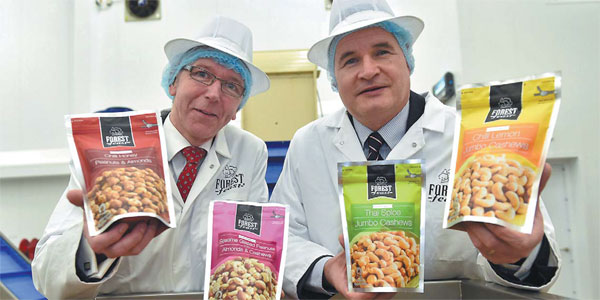Catering to the changing tastes of China's consumers

Northern Ireland firms move in on growing market
China's rise to be the world's second largest economy has led to a number of changes, from rising incomes to urbanization.
As people start to enjoy the benefits associated with higher incomes, they are also demanding higher quality and safer food and drinks.
| Products from Kestrel Foods are made with ingredients that are less readily available in the Chinese market and represent an exotic snack choice. Photos provided to China Daily |
Northern Ireland is keen on bringing its products to the Chinese market.
Chinese consumers are increasingly focused on the quality of dairy products, which could be driving strong growth in China's liquid milk market, according to a DairyCo report.
The report shows that imports of liquid milk to China grew 78 percent year-on-year in 2014, reaching nearly a third of milk powder import volumes. Liquid imports from the UK grew more than eight-fold, making the UK the ninth-largest supplier of liquid milk to China.
Some branded Northern Irish dairy products seem to have gained the confidence of Chinese shoppers.
Industry experts believe that Northern Ireland's natural climate, as well as its high standards of food security, has helped its dairy products to be popular with consumers, especially those in China.
Professor Chris Elliott, director at the Institute for Global Food Security, Queen's University Belfast, says: "When you look at milk production in Northern Ireland, it is very different to most parts of the world. Our cows graze on extensive open pastures feeding on the lush grass that our fertile soils and climate help nourish.
"We have a very long tradition of thinking about the welfare of animals and making sure that everything we produce is of the highest possible standards in terms of safety and quality."
In 2010 the government in Northern Ireland set out to develop the world's safest supply chain for animal feed materials, called the "Food Fortress" system, the most broad-ranging feed quality assurance scheme in the world, says Elliott.
A reputation for quality and safety has helped brands in Northern Ireland to capture their share of the Chinese market. One example is Lakeland Dairies, which has trading partners in over 70 countries worldwide.
"China and the wider Asia region have been identified as an area of high growth potential and we have committed to employing commercial and technical people based in the markets to find and satisfy new customers," says Dermot Farrell, general manager at Lakeland Dairies foodservice division.
"Our customers require confidence and an assurance that there are quality assurance checks in every link of the supply chain, so as to guarantee that the food they eat is nutritionally beneficial and healthy.

"Lakeland Dairies has been doing business in China for 5 years and we are currently shipping a range of long-life dairy creams, cream blends, ultra-high temperature (UHT) milks and flavored milks, through a number of trading partners."
UHT pasteurized milk which usually has a typical un-refrigerated shelf life of six to nine months without being opened, has become more popular with Chinese consumers.
Another company with a strong Chinese connection is Kestrel Food.
Kestrel Food, under the Forest Feast Brand, is a snack company offering a range of dried fruit, nuts and seeds.
"Our products are made with ingredients that are less readily available in the Chinese market that represent an exotic snack choice to the Chinese consumer," says Deirdre Burns, the company's marketing manager.
"In recent years, our international growth strategy has seen us strengthen our presence in over 30 international markets. Our particular success in key BRIC markets (Brazil, Russia, India and China) showed us that the Asian market represented a significant growth opportunity for our business and we directed investment accordingly."
In November the company exhibited at FHC China in Shanghai, a trade show for the global food and hospitality sector. The opportunity allowed Kestrel to cultivate business connections in China.
"We are currently focused on developing the strong business links we made during our time in China last year. We are also working with a number of Chinese companies who are currently testing Forest Feast products in the market and we hope to progress opportunities with these partners in the near future," Burns says.
One of Northern Ireland's oldest brands, Whites Speedicook, also has its sights set on the Chinese market.
Whites Speedicook has been milling oats at its original site in Tandragee, Co. Armagh, since 1841 and is a part of a farming cooperative that employs over 2,000 people.
"China is obviously starting to be of real interest to us. I suppose it has taken time and we would take each market quite slowly because, particularly when you're going overseas, you can make big mistakes.
"Now we're at a stage of working on the compliance of our products, so our products have the correct ingredients for China," says Mark Gowdy, sales and marketing manager.
"Currently, our presence in China is only through Shanghai's City Shop, but we have enough interest now to say that China will be a very large customer in the future. We know our products will fit the growing categories."
Gowdy has noticed that Chinese customers are looking to a Western lifestyle, as well as health and wellness, and believes Whites products fit this demand because oats are important in the fight against obesity.
Daniel Assab contributed to the story.
(China Daily European Weekly 05/22/2015 page15)
Today's Top News
- Japan tempting fate if it interferes in the situation of Taiwan Strait
- Stable trade ties benefit China, US
- Experts advocate increasing scope of BRI to include soft power sectors
- New engine powers cargo drone expansion
- China to boost green industry cooperation
- Manufacturing PMI rises in November































